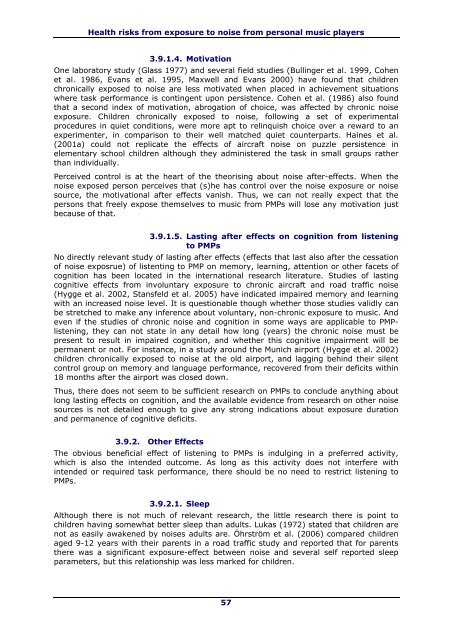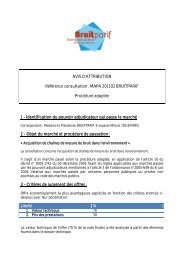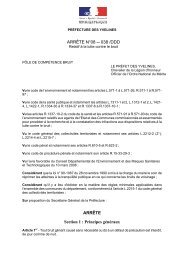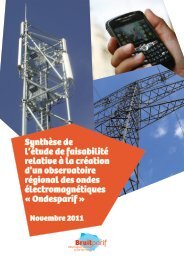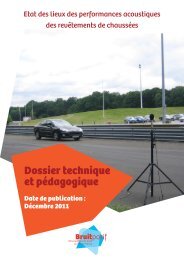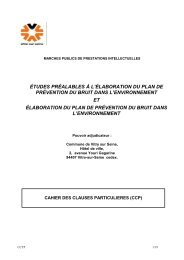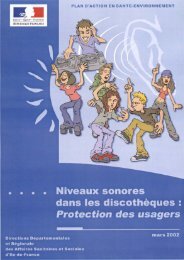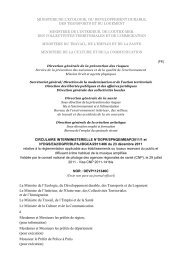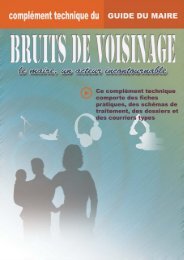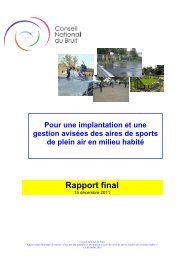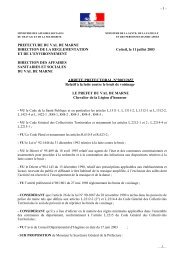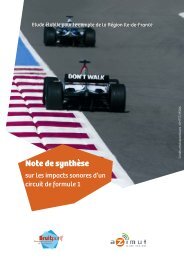Potential health risks of exposure to noise from personal music ...
Potential health risks of exposure to noise from personal music ...
Potential health risks of exposure to noise from personal music ...
You also want an ePaper? Increase the reach of your titles
YUMPU automatically turns print PDFs into web optimized ePapers that Google loves.
Health <strong>risks</strong> <strong>from</strong> <strong>exposure</strong> <strong>to</strong> <strong>noise</strong> <strong>from</strong> <strong>personal</strong> <strong>music</strong> players3.9.1.4. MotivationOne labora<strong>to</strong>ry study (Glass 1977) and several field studies (Bullinger et al. 1999, Cohenet al. 1986, Evans et al. 1995, Maxwell and Evans 2000) have found that childrenchronically exposed <strong>to</strong> <strong>noise</strong> are less motivated when placed in achievement situationswhere task performance is contingent upon persistence. Cohen et al. (1986) also foundthat a second index <strong>of</strong> motivation, abrogation <strong>of</strong> choice, was affected by chronic <strong>noise</strong><strong>exposure</strong>. Children chronically exposed <strong>to</strong> <strong>noise</strong>, following a set <strong>of</strong> experimentalprocedures in quiet conditions, were more apt <strong>to</strong> relinquish choice over a reward <strong>to</strong> anexperimenter, in comparison <strong>to</strong> their well matched quiet counterparts. Haines et al.(2001a) could not replicate the effects <strong>of</strong> aircraft <strong>noise</strong> on puzzle persistence inelementary school children although they administered the task in small groups ratherthan individually.Perceived control is at the heart <strong>of</strong> the theorising about <strong>noise</strong> after-effects. When the<strong>noise</strong> exposed person perceives that (s)he has control over the <strong>noise</strong> <strong>exposure</strong> or <strong>noise</strong>source, the motivational after effects vanish. Thus, we can not really expect that thepersons that freely expose themselves <strong>to</strong> <strong>music</strong> <strong>from</strong> PMPs will lose any motivation justbecause <strong>of</strong> that.3.9.1.5. Lasting after effects on cognition <strong>from</strong> listening<strong>to</strong> PMPsNo directly relevant study <strong>of</strong> lasting after effects (effects that last also after the cessation<strong>of</strong> <strong>noise</strong> exposrue) <strong>of</strong> listenting <strong>to</strong> PMP on memory, learning, attention or other facets <strong>of</strong>cognition has been located in the international research literature. Studies <strong>of</strong> lastingcognitive effects <strong>from</strong> involuntary <strong>exposure</strong> <strong>to</strong> chronic aircraft and road traffic <strong>noise</strong>(Hygge et al. 2002, Stansfeld et al. 2005) have indicated impaired memory and learningwith an increased <strong>noise</strong> level. It is questionable though whether those studies validly canbe stretched <strong>to</strong> make any inference about voluntary, non-chronic <strong>exposure</strong> <strong>to</strong> <strong>music</strong>. Andeven if the studies <strong>of</strong> chronic <strong>noise</strong> and cognition in some ways are applicable <strong>to</strong> PMPlistening,they can not state in any detail how long (years) the chronic <strong>noise</strong> must bepresent <strong>to</strong> result in impaired cognition, and whether this cognitive impairment will bepermanent or not. For instance, in a study around the Munich airport (Hygge et al. 2002)children chronically exposed <strong>to</strong> <strong>noise</strong> at the old airport, and lagging behind their silentcontrol group on memory and language performance, recovered <strong>from</strong> their deficits within18 months after the airport was closed down.Thus, there does not seem <strong>to</strong> be sufficient research on PMPs <strong>to</strong> conclude anything aboutlong lasting effects on cognition, and the available evidence <strong>from</strong> research on other <strong>noise</strong>sources is not detailed enough <strong>to</strong> give any strong indications about <strong>exposure</strong> durationand permanence <strong>of</strong> cognitive deficits.3.9.2. Other EffectsThe obvious beneficial effect <strong>of</strong> listening <strong>to</strong> PMPs is indulging in a preferred activity,which is also the intended outcome. As long as this activity does not interfere withintended or required task performance, there should be no need <strong>to</strong> restrict listening <strong>to</strong>PMPs.3.9.2.1. SleepAlthough there is not much <strong>of</strong> relevant research, the little research there is point <strong>to</strong>children having somewhat better sleep than adults. Lukas (1972) stated that children arenot as easily awakened by <strong>noise</strong>s adults are. Öhrström et al. (2006) compared childrenaged 9-12 years with their parents in a road traffic study and reported that for parentsthere was a significant <strong>exposure</strong>-effect between <strong>noise</strong> and several self reported sleepparameters, but this relationship was less marked for children.57


